How I Lived Through The End Of History
The rise and fall of America in one generation. Mine
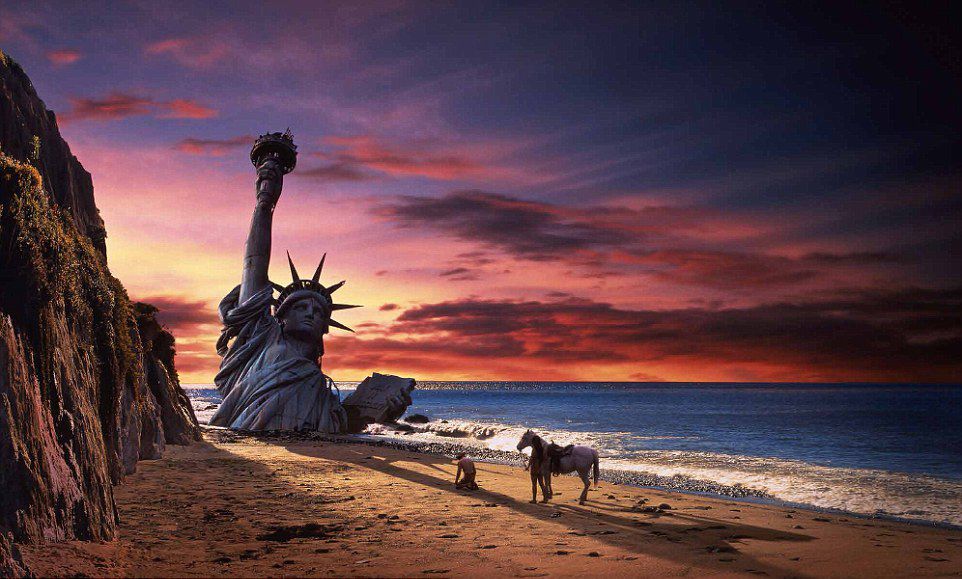
I grew up in America at the end of history, in the 1990s. The Cold War was over, Vietnam was past. Civil Rights were won and World War II was long gone. Nobody even remembered the last pandemic. America had won or at least survived it all. Last man standing, the last man of history. Francis Fukuyama called it The End Of History and it really felt like that. I was there and it was fucking boring. We lit fires and did drugs to pass the time.
In just 30 years, however, history has violently restarted and America has lost the plot. America has started another Cold War and lost another 19-year quagmire in Afghanistan. Somehow Civil Rights have been lost and Nazis have overrun the Capitol. Nobody remembers anything but pandemic. We're only at the end of history in the sense that capitalism has ravaged the planet. Now my children are growing up at the end of the world.
What the fuck were we thinking? What the hell happened? How did things collapse so fast? The American empire rose and fell in just one generation. Mine.
The End Of History
Fukuyama's essay really captures how people thought at the time. Writing even before the Soviet Union fell, he captured the sense that liberalism (democracy + capitalism) was the only ideology left. Indeed, that it was the best idea ever.
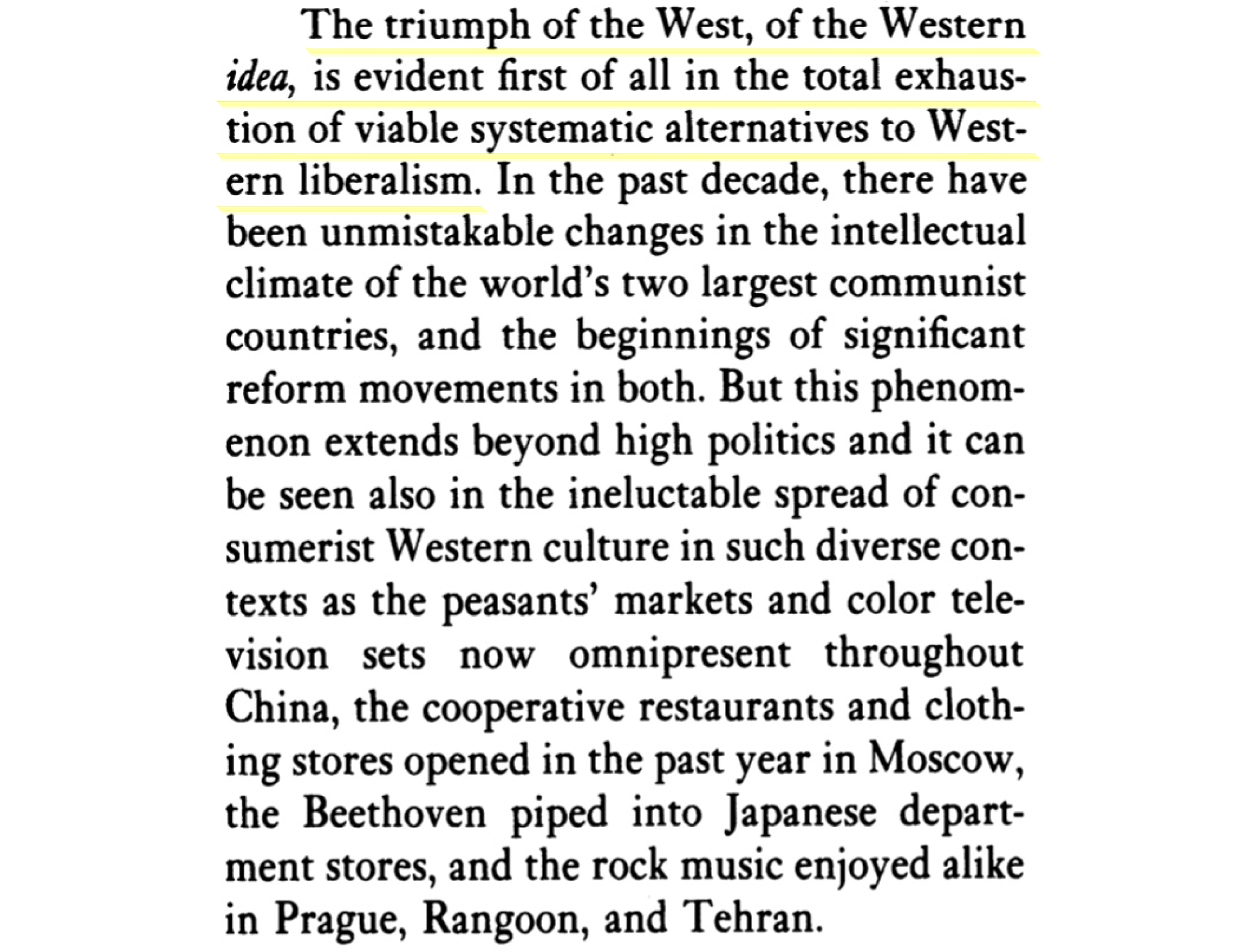
I was an immigrant growing up in suburban Ohio and it really felt like this. There was just so much stuff in America, and such beautiful words in its story. They were obviously doing something right, the supermarket was so big that Thatha warned us to not get lost. Especially after the USSR fell (allegedly also in awe of American supermarkets) everyone seemed to follow along. Sri Lanka, India, China, everybody was literally liberalizing.
What Fukuyama calls liberalism was the last ideology standing, and he confidently declared it the victor of history. Liberalism was the final Super Saiyan form of governance, the best and the baddest, no further transformations could occur. Fukuyama said,
What we may be witnessing is not just the end of the Cold War, or the passing of a particular period of postwar history, but the end of history as such: that is, the end point of mankind's ideological evolution and the universalization of Western liberal democracy as the final form of human government.
To Fukuyama, the end of history actually dated from 1806, when white people discovered this shit. If they ended up informing everyone through genocide, slavery, and exploitation, well, you're welcome.
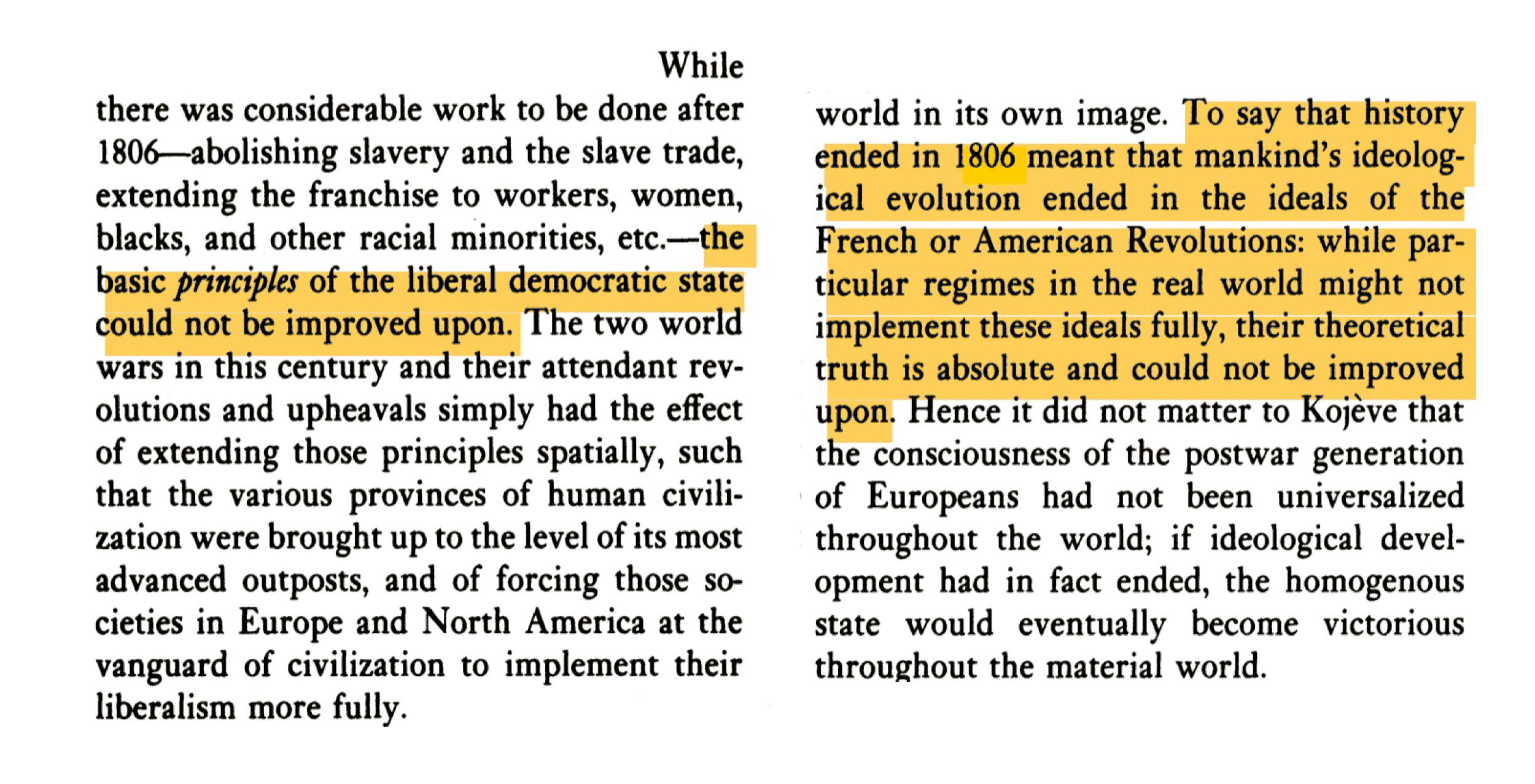
It's tempting to dunk on Fukuyama for hubris, but he's describing actual western thought, not inventing it. When Fukuyama says "that the basic principles of the liberal democratic state could not be improved upon" he's just stating the actual basis of western foreign policy. The West really thinks it's doing people a favor by bombing and besieging them. They're civilizing them. It's not conquest, really, they're just 'extending our principles spatially'.
He's also stating the actual basis of international development. Rich, white countries are called 'developed' (as in done) and everyone else is just 'developing' to be like them. If they need to be couped and sanctioned to help them along, so be it. In the long run, it's all for the best. Just helping backwards outposts along to the end of history.
Of course, what Fukuyama is saying isn't even especially original. The entire premise of colonialism is that Europe was a superior civilization. Everyone else were just savages, who should be thankful for the civilizing mission. The premise of white supremacy is white supremacy. Fukuyama was just modernizing the old imperial hubris and stating it out loud.
When Fukuyama says his empire is the best ever, you have to understand that every empire says that. No Egyptian priest was like "you know, Ra is great, but there must be bigger suns." Fuck no. Every empire is the greatest, the best, none shall surpass. Every empire wears the same sneer of cold command, and they all end up in the dust like old Ozy'mandem. As the Shelley poem goes,
And on the pedestal, these words appear:
"My name is Ozymandias, King of Kings;
Look on my Works, ye Mighty, and despair!"
Nothing beside remains. Round the decay
Of that colossal Wreck, boundless and bare
The lone and level sands stretch far away.
Empires have been standing athwart history yelling STOP ever since there were empires or history, and history keeps patiently kicking them in the balls. America actually got theirs in record time.
But first, I believed.
The American Faith
I was maybe 14 in the mid-90s when my whole class piled into buses and drove to Washington DC. We were visiting the temples of democracy, where they keep the faith.
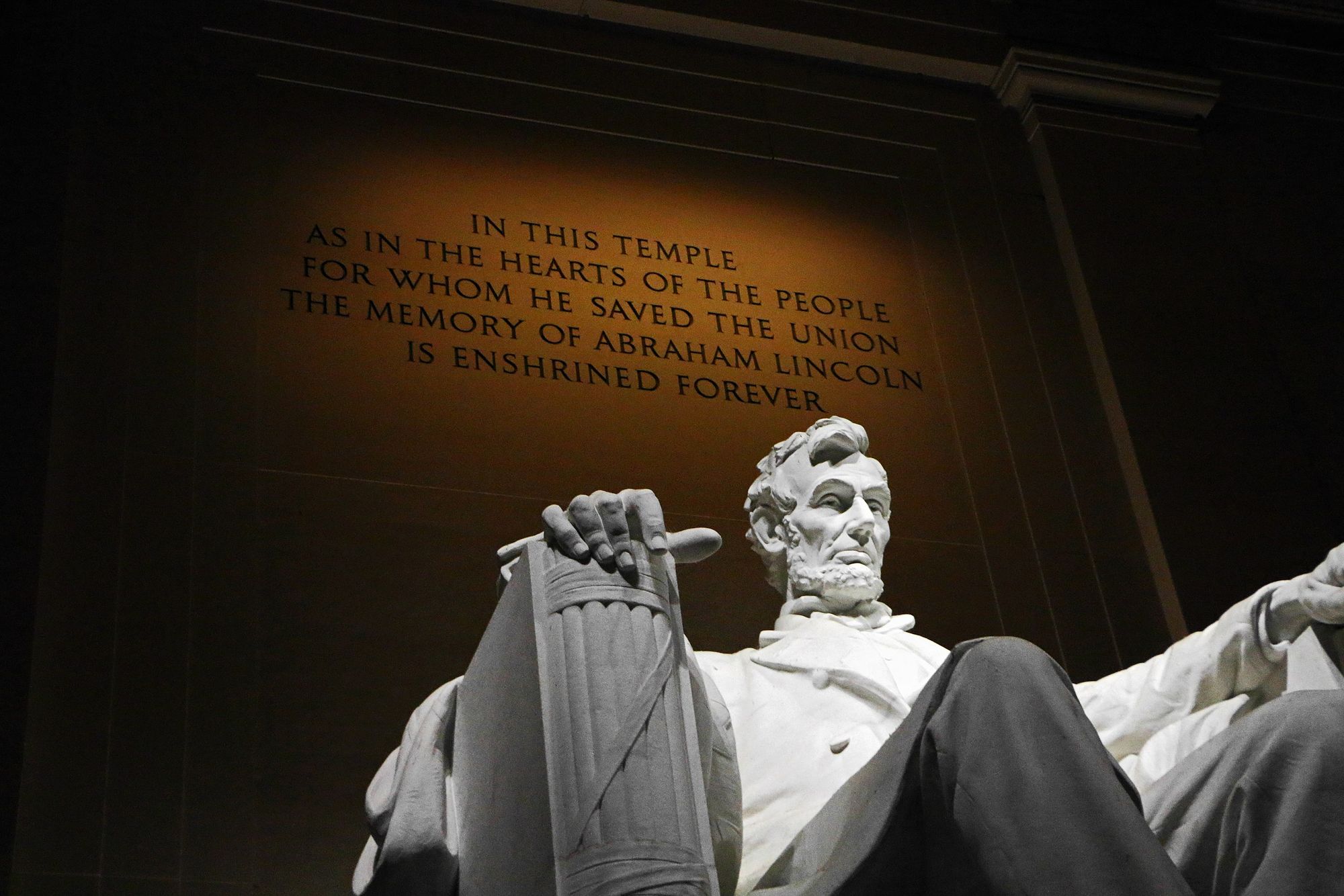
DC is full of Roman-style monuments and giant phalluses housing the spirits of Lincoln, Jefferson, and Lord Washington himself. We visited these holy sites then we went to the Hard Rock Cafe. That juxtaposition is important. It's actually Fukuyama's whole thesis.
The Lincoln Memorial and a cheeseburger. The National Mall and a shopping mall. That was the religion of American empire, liberal democracy wedded to capitalism. Fukuyama called liberalism a "state of consciousness... underwritten by the abundance of a modern free market economy." That's what I viscerally experienced in Washington DC.
I visited the theatre where Lincoln was martyred and then took communion with an overpriced cheeseburger next door. It wasn't a civics lesson, it was a religious experience. Fukuyama quite openly describes the end of history this way, as a state of consciousness, as an act of faith, except with works. He said liberalism was like believing in the Holy Trinity or holy cows, only better.
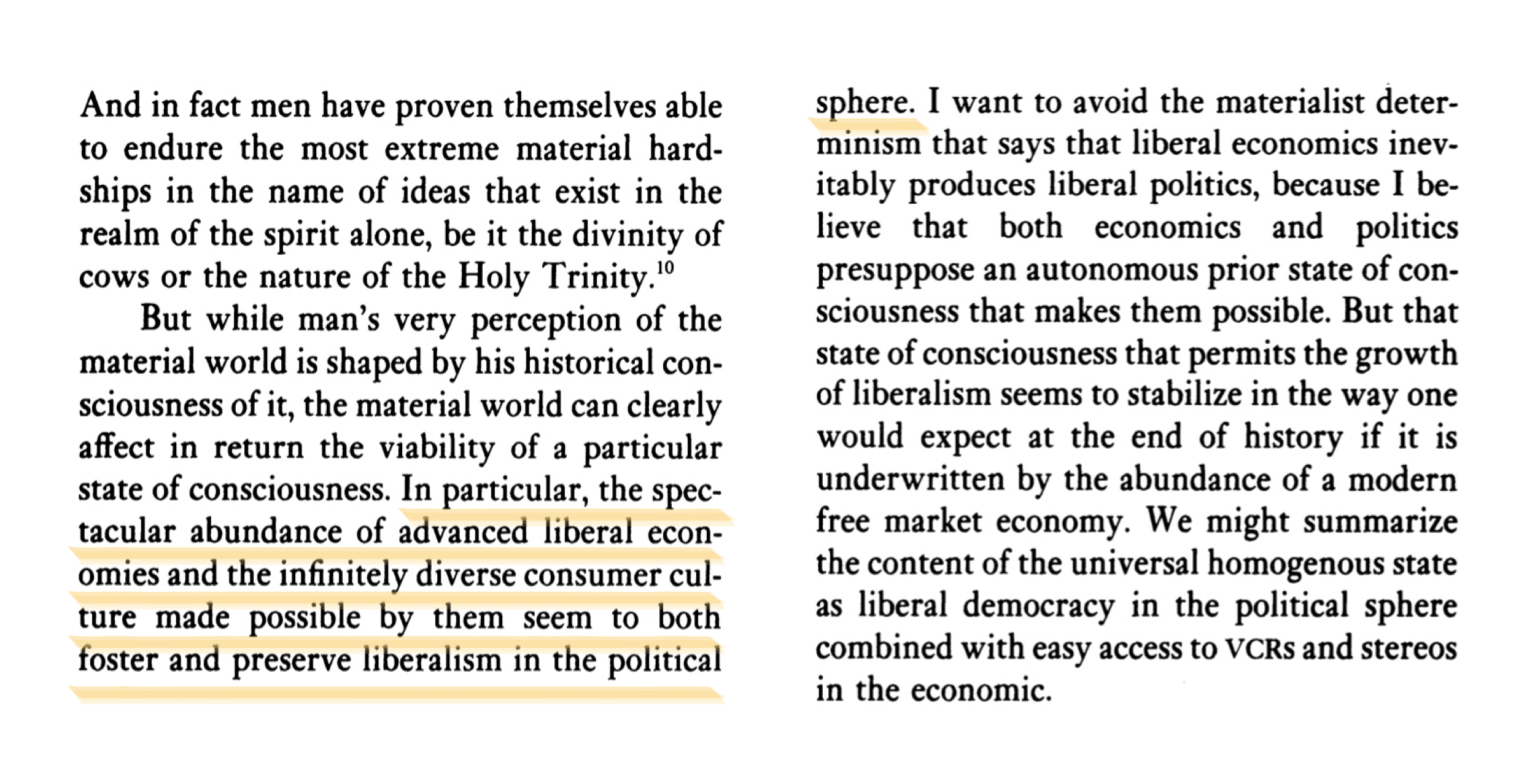
While Christianity promised eternal life, capitalism gave you life abundantly right now. Jesus multiplied loaves and fishes in the past, but McDonald's was serving Filet-O-Fish right now. I worked at McDonald's when I was 14, I saw it happen before my eyes. The food just appeared in cardboard boxes, we fried it, and money came out. Whatever dark magic the Americans were doing, it worked. Just look at all the stuff.
So I believed. How could I not believe? Capitalism wrought miracles every day. So I pledged allegiance to the flag and bought Tommy Hilfiger. I went to the 4th of July and ate red, white, and blue popsicles in the summer sun. When Fukuyama described the universal homogenous state he was describing where I lived, a suburban cul-de-sac at the end of history. He said,
We might summarize the content of the universal homogenous state as liberal democracy in the political sphere combined with easy access to VCRs and stereos in the economic.
You have to understand that this really how I grew up. I read social studies and then the Crutchfield stereo catalog at break. We were rich because we were free, we were free because we were rich. This wasn't a promise, in my rich, segregated town this was reality. As Fukuyama said about fascism, the ultimate proof of any ideology was not its morality but its material success. I was living in a material world and the Madonna, in this religion, was a material girl.
The End Of The End Of History
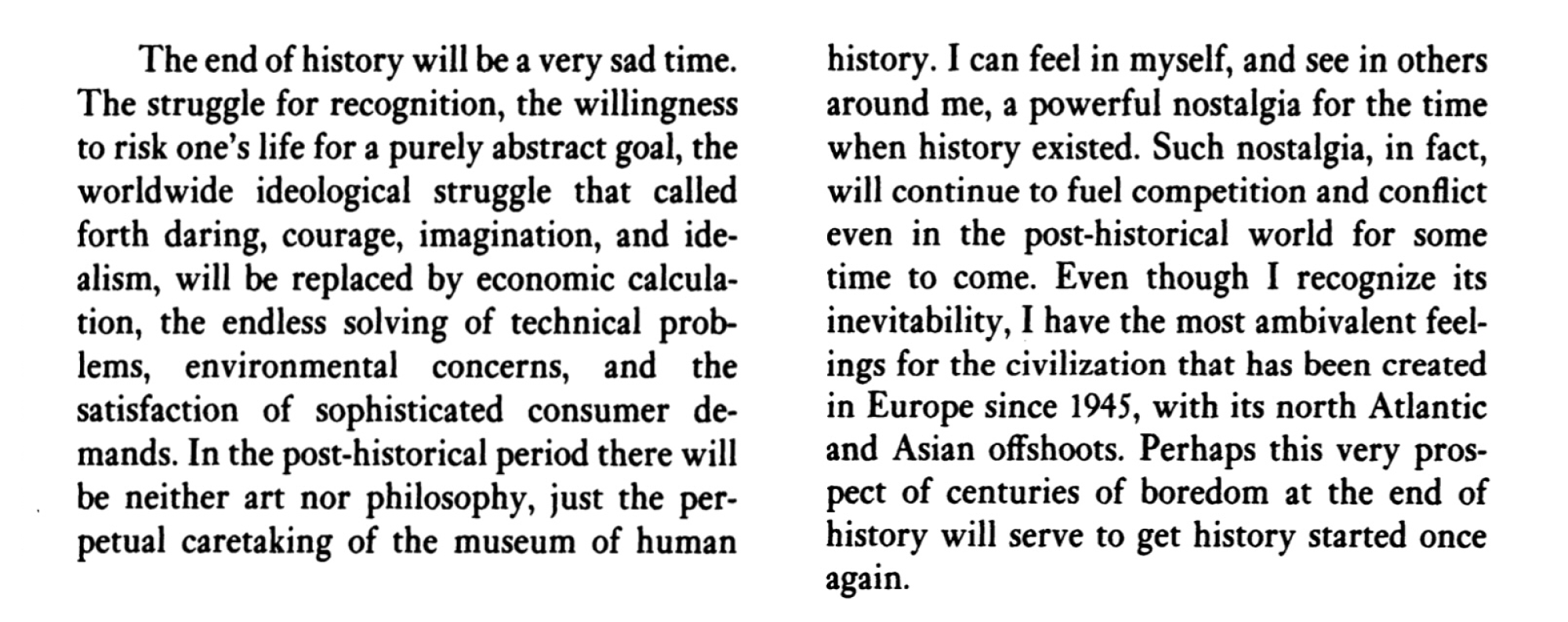
I left America in 2000 because, as Fukuyama says, the end of history was fucking boring. I was taught that freedom was discovered by the founders, saved by the Civil War, and finally delivered by the Civil Rights Movement. American history was done, and where was the fun in that? I went to Canada first, where an 18-year old could at least drink at the end of history, and then back in time to Sri Lanka.
But I never thought that American empire would end. I never thought my liberal faith could be wrong. In fact, that's only dawned on me now, with *gestures at everything*. The people inside an empire can't really date when it falls. As Eleanor Janega said, "If you asked a Roman on the street what they thought about the fall, they probably wouldn't understand."
History, I think, will date the collapse of America to 2001. When its temples of power were desecrated, when it lashed out in violent anger, and began collapsing into inequality, disease, and fascism. It was supposed to be the American century, but they only made it 9 months.
In September, Bin Laden kicked America in its financial and military nuts, hitting the World Trade Center and Pentagon. He missed the US Capitol, but in 2021 Americans attacked that themselves. No empire can survive such symbolic destruction. It's like Babylon losing the statue of Marduk. Power is the appearance of power, empire can't get hit in all the family jewels and survive.
20 years later, the American military has now lost multiple wars, their finance industry has collapsed, and their government has failed over and over again, most notably against a pandemic. The entire world is on fire, flooding, and dying from manmade climate change. Liberal capitalism was the end of history only in the literal sense that it ends the world.
Fukuyama said that "what destroyed fascism as an idea was not universal moral revulsion against it, since plenty of people were willing to endorse the idea as long as it seemed the wave of the future, but its lack of success." Well, look at America now. Not fucking successful. America's temples are defiled, its people are impoverished and defiant, its military humiliated and defeated. Success has turned to failure in just one generation, mine.
And so the end of history ends. History restarts again. People are dusting off communism, fascism, coming up with who knows what ideology next. Fukuyama said this moment might come after centuries of boredom, but it's all rushing back in terror. We have little to no time until the end of history becomes a prophecy, until liberalism becomes an apocalyptic death cult, until western hubris destroys the Earth. As the curse goes, we live in interesting times.
So welcome back to history, my friends. Any ideas?
I initially hate-read the essay The End Of History but I respect it now. You should read it yourself. Fukuyama does us a service by coming out and stating, clearly, the logic of empire. I dunno if he even agrees with it (he says he's ambivalent) but what he writes is descriptive more than prescriptive. This is really how empire thought and thinks, shorn of the 'aw shucks' bullshit. It really is a peek inside the mind of Leviathan, the logic of the empire in which we all live.